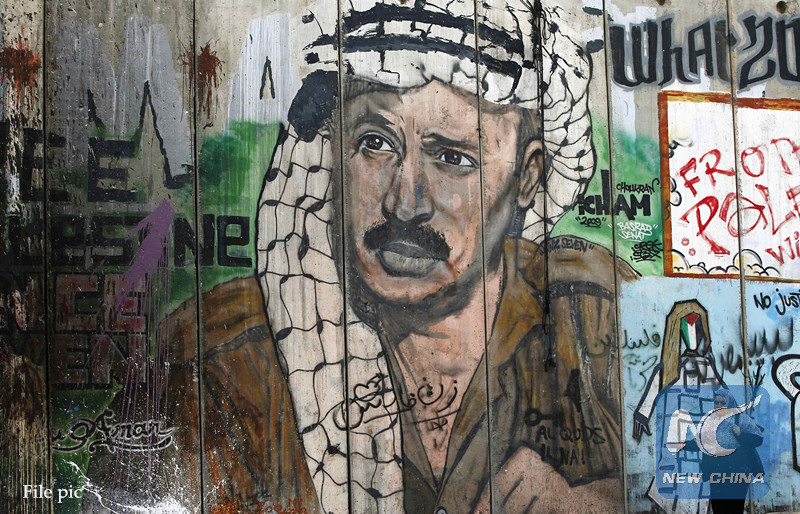
A Palestinian woman walks past a mural on the controversial Israeli barrier depicting the late Palestinian leader Yasser Arafat, at Qalandiya checkpoint near the West Bank city of Ramallah November 26, 2012. (REUTERS)
RAMALLAH, Aug. 29 (Xinhua) -- Palestinian families and advocates Wednesday marked the national day for the retrieval of the bodies and disclosure of the fate of the missing, in wars and conflicts between Palestine and Israel.
Salwa Hammad, coordinator of the national campaign for the retrieval of the bodies of Palestinian and Arab war victims and disclosure of the fate of those missing, said "this national day is of high importance to the families and the Palestinian society."
The move aims to tell the entire world that Israel withholds bodies of war victims and that it still deliberately withholds bodies of war victims and tries to use them as a bargain chip in negotiations for prisoners swap with Gaza, she said.
The campaign organizers also launched an electronic campaign on social media platforms, submitted a letter to the UN high commissioner for human rights in the occupied Palestinian territories, and held a march in Ramallah by the families of the deceased or missing Palestinians.
"Today we mark ten years of our systematic work to retrieve their bodies, and we will continue until the very last one of them, whether they were the documented cases by our national campaign or not," Hammad said.
Since its launch in 2008, the campaign has documented the cases of over 400 slain Palestinians.
According to Israeli officials, the cemeteries in Israel are labeled as military zones bearing no indicator for graves except numbered metal plates written "cemeteries of the enemy's deceased," and families were not allowed to visit.
Israel begun exercising the policy of withholding bodies of slain Palestinians after 1967, but it stopped after a legal activity of the Israeli courts in 2008.
However, Israel resumed the policy in 2015 after a wave of alleged ramming and stabbing attacks broke out between Palestinians and settlers in the West Bank, during which it withheld bodies of 28 Palestinians killed by Israeli forces.
The campaign believes there are at least 65 Palestinian fighters who went missing as a result of the 1967 war, saying that Israel refuses to give out any information about them, or the number of those buried in the cemeteries "of the enemy's deceased."
Israeli authorities released a total of 131 bodies of those withheld in the past four decades. The High Israeli court ruled in 2014 in favor of releasing 37 of those bodies, but the authorities only released 28 of them. The campaign accused Israel of using the deceased bodies in political pressure.
Rights group behind this campaign, Jerusalem Legal Aid and Human Rights Center, said that this policy is a form of collective punishment and "an unprecedented punishment of the dead," slamming what it described as "Israel's exploitation of the pains of parents of martyrs for political ends."
Fatima Al-Faqih told Xinhua that her cousin's body was released a few years ago after the campaign's persistent work, and now calls for the release of her brother's body who has been withheld by Israel for two years.
"Our family will continue to join efforts in every solidarity activity and we will not get tired. We will continue to demand the release of the bodies, whether they are in cemeteries or in refrigerators," she said.
Zainab Ankoush, whose son was killed by Israeli soldiers after an alleged stabbing attack in Jerusalem over 14 months, said "the least they can do is giving back the body of my son and the others, so that we can bury them and know that this is where he lies, this is his grave, where I can go see him when I miss him or at holiday."
Hamda Abu Jildeh, the daughter of a Palestinian fighter who was killed by Israeli forces in 1969, joined the march in Ramallah, coming from Nablus to shed light on her long quest to find her father's body and bury him in his hometown.
"I'm the daughter of martyr Mufadhi Hamad Abu Jildeh, who died on Oct. 9, 1969 but till now his body is withheld and we never got the chance to bid a final farewell. We never saw him. He died without us seeing him, so now we demand that his body is handed over so that we can honor his memory and burial duty," said Abu Jildeh.
Over the past decade, lawyers and families of slain and missing Palestinians have argued that the biological and physical characteristics are fading away due to lack of attention and thus have demanded the establishment of a DNA bank in order to identify the bodies upon their release.
Under International law, returning the corpses of those who fall within war zones upon the request of their family or state is binding. Geneva conventions have stressed such commitment based on humanitarian rights and respect to human dignity.

